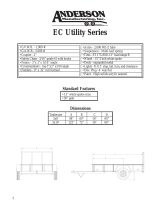
7
TO ENSURE SAFETY
Battery charger/Battery charger cord
SM-BCR1: Battery charger for SM-BTR1
•
Hold the power plug when connecting or disconnecting the plug. Failure to do so may cause a fire or electric shock.
•
If the following occurs, stop using the device and contact a dealer. A fire or electric shock may occur.
*
If heat or acrid-smelling smoke is coming out from the power plug.
*
There may be a bad connection inside the power plug.
•
Do not overload the electrical outlet with appliances beyond its rated capacity, and use only a 100 – 240 V AC electrical outlet. If the electrical outlet is
overloaded by connecting too many appliances using adapters, overheating resulting in fire may occur.
•
Do not damage the power cord or power plug. (Do not damage, process, let near hot objects, bend, twist or pull them; do not place heavy objects on
top or bundle them tightly.) If they are used while damaged, fire, electric shocks or short-circuits may occur.
•
Do not use the charger with commercially-available electrical transformers designed for overseas use, as they may damage the charger.
•
Always be sure to insert the power plug as far as it will go. If this is not observed, fire may occur.
SM-BCR2: Battery charger for SM-BTR2/BT-DN110/BT-DN110-A
•
Do not use any USB cable other than the USB cable which is supplied with the PC linkage device. This may cause a charging error, fire, or failure to
connect to PC due to overheating.
•
Do not connect the charger to PC when it is on standby. This may cause a PC failure depending on its specifications.
•
When connecting or disconnecting the USB cable or the charger, be sure to hold the cable by the plug. Failure to do so may cause a fire or electric
shock. If the following occurs, stop using the device and contact a dealer. A fire or electric shock may occur.
*
If heat or acrid-smelling smoke is coming out from the power plug.
*
There may be a bad connection inside the power plug.
•
If it thunders while charging with an AC adapter with a USB port, do not touch the device, bicycle, or the AC adapter. If lightning strikes, electric
shocks may occur.
•
Use an AC adapter with a USB port with a voltage of 5.0 Vdc and with a current equal to or higher than 1.0 Adc. If the one with a current lower than
1.0 Adc is used, a charge error may occur or the AC adapter may heat up, leading to a fire.
•
Do not use a USB hub when connecting the cable to a computer USB port. This may cause a charging error or fire due to overheating.
•
Be careful not to damage the charging cable. (Do not damage, process, let near hot objects, bend, twist or pull them; do not place heavy objects on
top or bundle them tightly.) If they are used while damaged, fire, electric shocks or short-circuits may occur.
Brake
•
Each bicycle may handle slightly differently depending on the model. Therefore, be sure to learn the proper braking technique (including brake lever
pressure and bicycle control characteristics) and operation of your bicycle. Improper use of your bicycle's brake system may result in a loss of control or
a fall, which could lead to severe injury. For proper operation, consult a professional bicycle dealer or the bicycle's owner's manual. It is also important
to practice riding and braking, etc.
•
If the front brake is applied too strongly, the wheel may lock and the bicycle may fall forward, and serious injury may result.
•
Always make sure that the front and rear brakes are working correctly before riding the bicycle.
•
The required braking distance will be longer during wet weather. Reduce your speed and apply the brakes early and gently.
•
If the road surface is wet, the tires will skid more easily. If the tires skid, you may fall off the bicycle; therefore, to avoid this, reduce your speed and
apply the brakes early and gently.




















